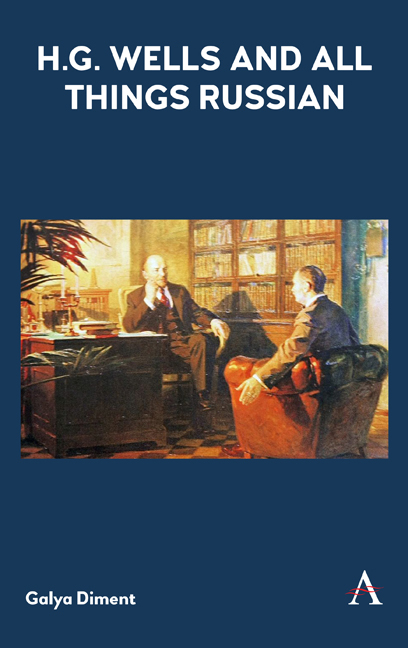Book contents
- Frontmatter
- Dedication
- Contents
- List of Illustrations
- Acknowledgments
- List of Contributors
- A Note on Transliteration
- Introduction: “The Wells Effect”
- Part One WELLS IN RUSSIA: PRE-WORLD WAR II
- Part Two WELLS IN RUSSIA: POST-WORLD WAR II
- Part Three RUSSIA IN WELLS
- APPENDIX TRANSLATIONS
- Appendix 1 V. D. Nabokov on Visiting H. G. Wells in England in 1916 (From Iz voiuiushchei Anglii, 41–51)
- Appendix 2 Alexander Amfiteatrov on Wells's 1920 Visit to Russia
- Appendix 3 Alexander Belyaev on the Wells-Lenin Debate about “Utopias”
- Appendix 4 Karl Radek and Solomon Lozovsky to Stalin
- Appendix 5 Yury Olesha on His Love for H. G. Wells (In Literaturnyi Kritik 12 (1935), 156–7)
- Appendix 6 Yuly Kagarlitsky on Being a Soviet Biographer of Wells
- Bibliography
- Wells, Herbert George – Works Index
- General Index
Appendix 1 - V. D. Nabokov on Visiting H. G. Wells in England in 1916 (From Iz voiuiushchei Anglii, 41–51)
from APPENDIX TRANSLATIONS
Published online by Cambridge University Press: 06 September 2019
- Frontmatter
- Dedication
- Contents
- List of Illustrations
- Acknowledgments
- List of Contributors
- A Note on Transliteration
- Introduction: “The Wells Effect”
- Part One WELLS IN RUSSIA: PRE-WORLD WAR II
- Part Two WELLS IN RUSSIA: POST-WORLD WAR II
- Part Three RUSSIA IN WELLS
- APPENDIX TRANSLATIONS
- Appendix 1 V. D. Nabokov on Visiting H. G. Wells in England in 1916 (From Iz voiuiushchei Anglii, 41–51)
- Appendix 2 Alexander Amfiteatrov on Wells's 1920 Visit to Russia
- Appendix 3 Alexander Belyaev on the Wells-Lenin Debate about “Utopias”
- Appendix 4 Karl Radek and Solomon Lozovsky to Stalin
- Appendix 5 Yury Olesha on His Love for H. G. Wells (In Literaturnyi Kritik 12 (1935), 156–7)
- Appendix 6 Yuly Kagarlitsky on Being a Soviet Biographer of Wells
- Bibliography
- Wells, Herbert George – Works Index
- General Index
Summary
Vladimir Dmitrievich Nabokov (1870– 1922) was a politician, a statesman, one of the editors of Russia's liberal newspaper Rech’ (Speech), and an unabashed Anglophile as well as an avid fan of H. G. Wells. He was also the father of Vladimir Nabokov, the writer who on numerous occasions expressed his appreciation of H. G. Wells whose novels he devoured as a teenager. During Wells's first visit to Russia, in the winter of 1914, V. D. Nabokov published his interview with Wells in Rech’ and hosted him for dinner at the Nabokovs’ splendid mansion on Morskaya street. His son was 14 years old at the time and remembered that dinner well. Upon coming back from Russia, H. G. Wells described V. D. Nabokov in a letter to the editor of Labour Leader as “one of the most brilliant Liberal statesmen in Russia” (Correspondence, II, 381). In the winter of 1916, Nabokov and five other Russian journalists and writers, including Korney Chukovsky and Alexey Tolstoy whom he mentions below, were invited to visit wartime England and examine its military. Upon returning to Russia, Nabokov published Iz voiuiushchei Anglii: Putevye ocherki (From the Fighting England: Travel Essays), where, among other impressions, he detailed his visit to Wells in a small English village where Wells rented a house, “Easton Glebe,” from his friend, Lady Warwick. V. D. Nabokov and his family fled Russia after the Bolshevik revolution and he became a victim of a political assassination in Berlin. For more on Wells and the younger Nabokov, see Chapter 3 by Zoran Kuzmanovich in this volume.
“Wells is expecting us to come to his village tomorrow. I will pick you up at 9:30 am.” This invitation was passed along to me one Saturday when I was in London by Hagberg Wright.
[…]
The next morning […] Wright indeed came to our hotel in his car and picked up Chukovsky, Tolstoy and me. We went to the Liverpool [Street] Train Station. Wells lives in a village about 60 versts northeast of London. These are the expansive estates of Lady Warwick, a famous advocate of socialist ideas.
- Type
- Chapter
- Information
- H. G. Wells and All Things Russian , pp. 175 - 180Publisher: Anthem PressPrint publication year: 2019



